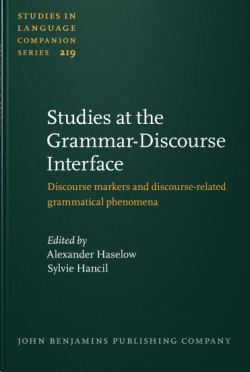Studies at the Grammar-Discourse Interface. Discourse markers and discourse-related grammatical phenomena
N° ISBN : 978-9-027-20869-9
Editeur : John Benjamins
This book investigates phenomena at the grammar–discourse interface with a strong focus on discourse markers, whose development and concrete uses in a given language tend to be based on a close interplay of grammatical and discourse-related forces. The topics range from the transition of linguistic signs “out of” sentence grammar and “into” the domain of discourse to differences between more grammatical vs. more discourse-pragmatic expressions in terms of structural behavior and cognitive processing, and the different, intricate ways in which the usage conditions and meanings of grammatical constituents or structural units are affected by the discourse context in which they are used. The twelve studies in this book are based on fresh empirical data from languages such as English, Basque, Korean, Japanese and French and involve the study of linguistic expressions and structures such as pragmatic markers and particles, comment clauses, expletives, adverbial connectors, and expressives.
Editors : Sylvie Hancil (University of Rouen Normandie) Alexander Haselow (University of Münster)
TABLE OF CONTENTS
- Grammar, discourse, and the grammar-discourse interface
Alexander Haselow and Sylvie Hancil
PART I — DISCOURSE MARKERS
- Chapter 1 — On the rise of discourse markers
Bernd Heine, Gunther Kaltenböck, Tania Kuteva and Haiping Long - Chapter 2 — On the pragmatic development of modal particles in Navarrese-Lapurdian Basque: Hori emain ote nauzu?
Sergio Monforte - Chapter 3 — On divergent paths and functions of ‘background’-based discourse markers in Korean
Seongha Rhee and Hyun Jung Koo - Chapter 4 — Reanalysis and the emergence of adverbial connectors in the history of Japanese
Reijirou Shibasaki
PART II. DISCOURSE MARKERS
- Chapter 5 — The meaning and functions of French je pense (que): A constructionalist and interactional account
Juliette Angot and Maj-Britt Mosegaard Hansen - Chapter 6 — Discourse markers and brain lateralization: Evidence for dual language processing from neurological disorders
Alexander Haselow - Chapter 7 — Vietnamese expletive between grammatical subject and subjectivity marker: Nó at the syntax-pragmatics (discourse) interface
Huy Linh Dao - Chapter 8 — The final particle like in Northern English: A particle of reformulation in the context of interenunciative readjustment
Sylvie Hancil - Chapter 9 — On pragma-semantics of expressives: Between words and actions
Suren Zolyan
PART III. DISCOURSE-RELATED GRAMMATICAL PHENOMENA
- Chapter 10 — A just amazing marker in French: “Juste” “Juste excellentissime!” “Juste super heureux!” “Juste irréel!” “Juste pas possible!”
Danh Thành Do-Hurinville - Chapter 11 — On how the distinction between reciprocal and collective verbs affects (anti-)control
Anna Snarska - Chapter 12 — The rise of cause/reason adverbial markers in Yaqui (Uto-Aztecan)
Albert Álvarez González






